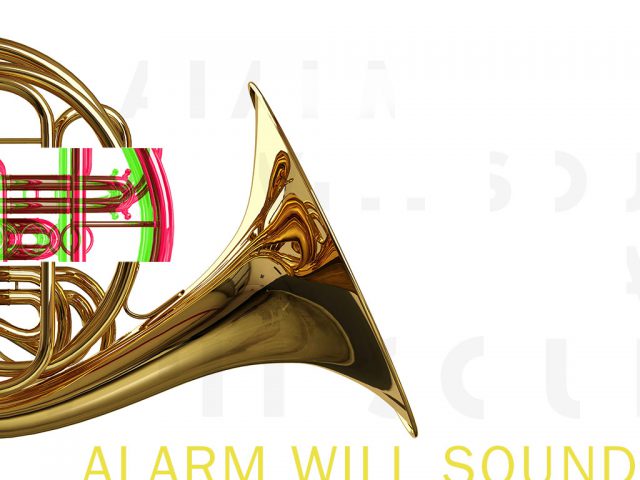
OR: One Percussionist’s Mission to Uncover the True Meanings of Aphex Twin Track Titles.
I haven’t done it much myself, but I imagine that naming a piece of music must be insanely frustrating. There’s this delicate balance required in order to be taken seriously, and of course you can never please everyone. Don’t be to literal (or too vague). Don’t be too cold (or too sentimental). Don’t be too blunt (or too long-winded). The critic maybe thinks it’s clever, the fan maybe thinks it’s pretentious, or the other way around. Your family doesn’t get it (or possibly even worse: they get it way too clearly). You could always play it safe with the least offensive thing possible, but there are bound to be very few of those options left.
Maybe it’s all the babies the members of this band have brought into the world recently, but I can’t help compare it to the arduous process of picking a name for a baby. Don’t be too traditional (or too trendy). Don’t be too religious (or too hippie-dippy). Certainly don’t be naive enough to think that whatever name you choose is always going to invoke the same association it did the day you choose it: after all, there was a Roosevelt named Kermit, but of course there’s also a The Frog named Kermit. You could always just do what everyone else is doing, but does the world really need another Chloe?
When it comes to naming music and babies, I feel like it takes a brilliant linguist or a sort-of-crazy-person to do something truly original. I’ll start with the linguist:
When I first met Nico Muhly, most of his pieces had titles that implied a connection to old-school minimalism, but at the same time added a touch of emotional description that gave a little more context and a little less coldness.
Beaming Music
Clear Music
Honest Music
Pillaging Music
Radiant Music
Video Game Music
Sounds like minimalism, with the single-descriptor title, but that descriptor hints not at the instrumentation or compositional process (like Music for 18 Musicians, or Music in Parallel Motion), but rather at the emotional content of the music. It wouldn’t be unexpected to see a composer ride out a stylistic idea for a naming convention that works so well for much longer than he did (if not for a whole career). But ever so gradually, this other completely genius thing started to happen, which I could never quite figure out until I started stacking the titles on top of each other in my head and then putting the whole thing on shuffle. What emerged: Secret Narrative!
Expecting the Main Things From You
How Soon?
How About Now
It’s About Time
Time After Time
From Here on Out
A Good Understanding
It Goes Without Saying
So to Speak
By All Means
It Remains to be Seen
Seeing is Believing
Out of the Loop
Keep in Touch
Wish You Were Here
I’m not implying that these narrative threads were necessarily conscious or intentional (though I’ve never asked him about it), but I do think that they are a particularly interesting result of stylistic consistency and a talent for phrases.
Nico also has a dog named Óskar Wardell Nebbi Dogþór.
Moving on to the sort-of-crazy-person: Aphex Twin is just one of many aliases of the great electronic composer Richard D. James, who’s cryptically named tracks perfectly mirror his playfully confusing public personae. Richard’s mythology includes maybe-true stories about owning a tank, lucid dreaming, living in an abandoned bank, and performing in a giant bear suit with only a laptop. His 1994 double-album-masterpiece Selected Ambient Works Volume II not only used abstract album art in lieu of track titles, but also required the listener, in order to know which picture corresponded to which track, to decipher a logic puzzle using track lengths and color coded pie charts.
Given all this, when I originally bought his 2001 album drukQs, my only thought about the track list (which includes titles like Omgyjya Switch7, Bbydhyonchord, and Gwely Mernans) was that “these are either made-up words, or are not something that I’m meant to understand.” Certainly Richard D. James himself was not likely to give away their meanings. Only later, when I read that many of the titles came from Kernawek (Cornish), a derivative of Breton and Welsh spoken by only about 300 people in Richard’s native Cornwall, did I become curious to find out what they really meant.
My search started in the usual places: Wikipedia, and the obligatory forums full of the fans who obsessively edit those Wikipedia pages. People provided translations or theories for almost every one of the 30 tracks, but the information given seemed sketchy at best, and in fact, given that the primary source was one forum regular named “Centurix” and his allegedly-Cornish father-in-law “John,” I thought it might be best to seek out a more authoritative source.
So after one lost day searching 19th century Cornish/English Dictionaries on Google Books and finding almost nothing (I think “Holon” means “Heart”), I decided to get in touch with the “Cornish Language Partnership.” They have an online translation service! I eagerly compiled everything and composed the most formal email I could possibly write, trying to make what I was doing seem like a doctoral dissertation and of course explaining who this Richard D. James is because of course they wouldn’t know, right? Imagine my surprise when I received (almost immediately) the following email, which they had clearly sent out many times before:
Dear Mr Thompson,
Thank you for your translation request. Some of these song titles by the Aphex Twin are indeed Cornish, but most are not. Here are translations of the ones that are in Cornish:
Jynweythek – Mechanical
Omgyjya-Switch7 – (the first word is a swear word alluding to pleasuring oneself)
Strotha Tynhe – To Squeeze To Tighten
Gwely Mernans – Deathbed
Gwarek – Arch
Hy A Scullyas Lyf A Dhagrow – She Shed A Flood Of Tears
Kesson Dalef – Harmonious Voice (lef means voice but dalef has no meaning, so this is only a rough translation)A number of the other song titles are made to look as if they are Cornish, but have no meaning (for example: ‘Ruglen Holon’), and others have obvious elements such as ‘54 Cymru Beats’ where Cymru is the Welsh word for Wales.
I hope this helps, but I’m afraid I am not aware of there being a definitive explanation for all of the track titles, and all I can really help you with is the ones that are actually in Cornish.
Apparently I wasn’t the first person to ask. A bit enlightening, but mostly sad trombone given all that went unexplained. I felt like there must be more. One user on the message boards had speculated about archaic scripts and it certainly sounded plausible:
Omgyjya Switch7
Old language again. So as to deal with old scripts, modern characters tend to use numbers in order to substitute some elements. Thus, a long “z” is written with a “3” and is pronounced “th”. Same thing for “7” which is like a “t”.
So I passed this idea on to my new friend at the CLP and she proved to me that you unfortunately can’t believe everything you read on the internet:
Dear Chris,
Thanks for your e-mail.
I have never heard of numbers being used to represent letters in Cornish, and think this is very unlikely. Certainly there would have been styles of handwriting used in Cornish language manuscripts where letters such as ‘z’ might have been written as it is in the Cyrillic alphabet (З) but this is not the number 3. As for 7 representing the letter ‘t’, again all I can think is that in certain handwriting a capital T might resemble a number 7 in some way, but this is by no means a coded way of writing to employ numbers in place of letters.
Even if you were to follow the possibility that these numbers might represent letters, this would still not make any sense of ‘Switcht’ or ‘Beskhuthepnm’.
And so the search for meaning continues. My guess is that Richard D. James prefers the ambiguity of the general public not really knowing what it’s all supposed to mean, but he does want us to be very compelled to guess.
I don’t think Richard has any children and has thus probably never named a baby, but he did name a track on drukQs “lornaderek,” which I of course thought was Cornish, but I’m told is actually just the combined names of both his parents, Lorna and Derek.

